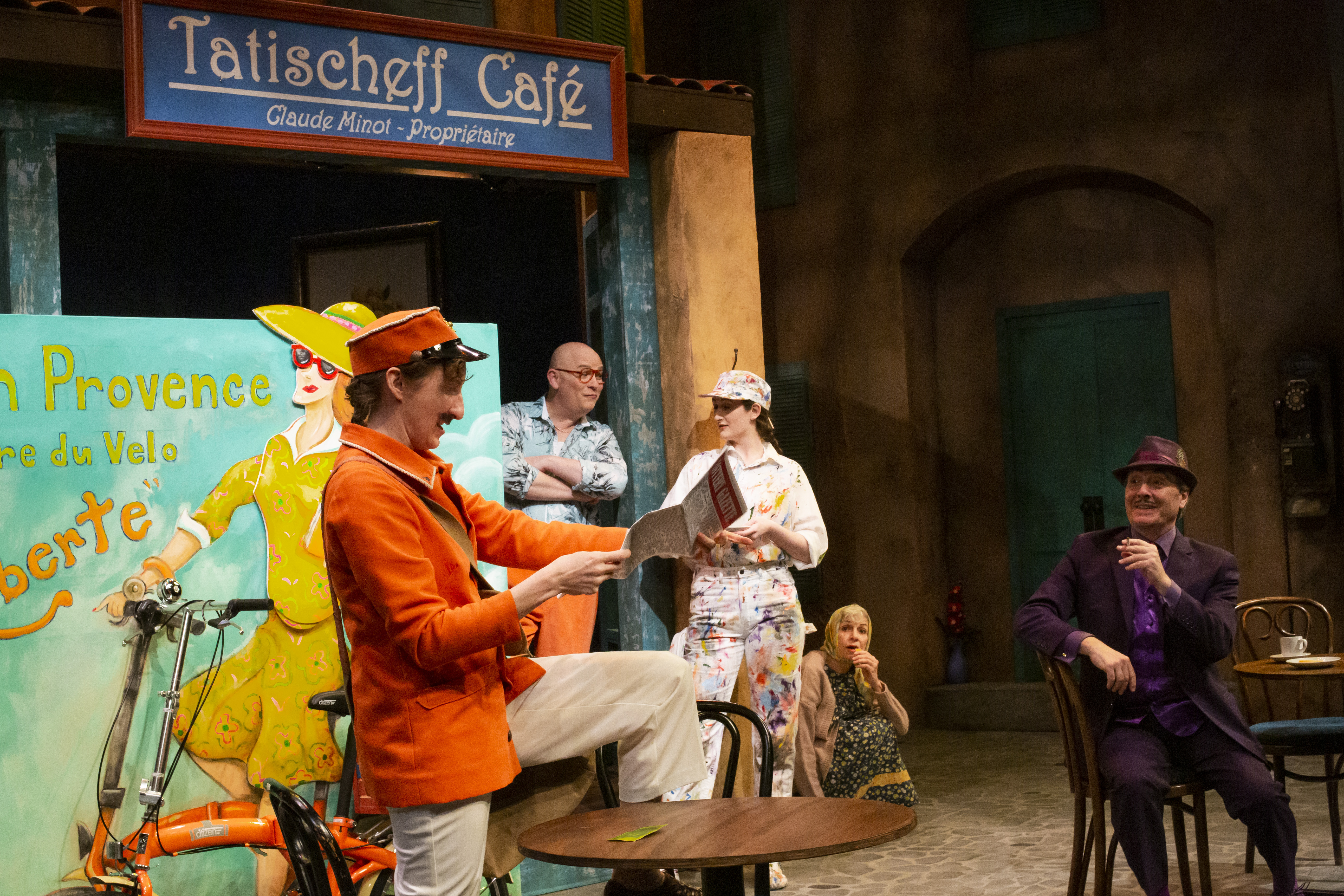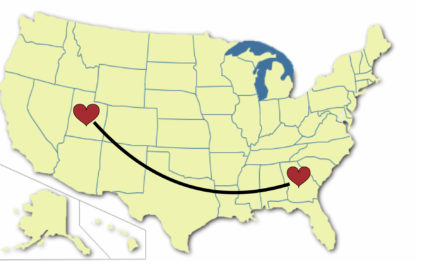
Actors on stage before “The Tatischeff Cafe” debuts/Courtesy Ann Watson of Emory Photo and Video.
Professor of Theater Studies John Ammerman sits at a table during rehearsals for “The Tatischeff Cafe.” In character, he places a small bag on top of the table, leaning a photograph of Marilyn Monroe against it. But it’s not quite right: he has positioned the image upside-down. Wistfully, he flips it over and keeps waiting patiently for his own Marilyn to appear.
Ammerman plays a lovelorn Frenchman in “Tatischeff,” a play that he wrote and co-directs for Theater Emory. The play takes place in a French cafe as a community of villagers celebrate a birthday amidst music and magic. Set for an April 4-14 run, the production is still in rehearsals.
While other directors will often modify plays obsessively before opening night, neither Ammerman nor co-director Clinton Thornton plan to rewrite any lines for “Tatischeff.” That’s because no words are spoken in the play, except for French gibberish, as Ammerman designed the piece to be a tribute to mid-century mime and filmmaker Jacques Tati.
Yet the limits of pantomime do not constrain Ammerman’s self-expression. Shortly after his character adjusts the photograph, he makes eye contact with a homeless woman, referred to as the bag lady, from across the cafe. He jumps up from his chair to pull out a seat for her, a purple fedora covering his wavy gray hair. The bag lady, adorned in a purple blouse and a white muslin scarf, gracefully trots over to accept. When the couple realizes that they’ve both brought the same purple handkerchiefs to the café, they exchange them and dance across the stage. Ammerman has painted a picture of love with just a few brushstrokes of motion.
“[Mime] is a universal language. Everybody cries. Everybody laughs,” Ammerman said. “We’re trying to trigger very universal things that people can relate to.”
Ammerman said that he has been fond of mime techniques since he was young. He attributes most of his early interest to Red Skelton, the host of an eponymous comedy and variety television show during his childhood, and to the silent film actor Charlie Chaplin. By the mid-1960s, Skelton started featuring French mime Marcel Marceau on his program, giving the performer a wide audience in the United States.
It took Ammerman awhile to formally pursue his interests in mime. As a high schooler, he was busy with sports until he stopped enjoying them.

John Ammerman/Forrest Martin, Asst. Photo Editor
“I got tired of the punishment element of being in organized athletics,” said Ammerman, laughing.
After he earned his varsity letter, he decided to quit and audition for a play instead. By his fourth year at Central Michigan University, Ammerman was performing in mime. Ammerman would later earn a Master’s of Fine Arts in Performance from the University of Georgia.
He stressed the physical exertion that mime performances require, for which he thought he was well prepared due to his background in sports.
“I got to a point where athleticism and mime made a lot of sense to me,” Ammerman said. “It was just something I had an ability to do.”
Ammerman later chased his passion by enrolling in the first class of Marcel Marceau’s American school.
“He actually threw my work into a whole different stratosphere,” said Ammerman, identifying Marceau as the “greatest master” of mime.
Since then, Ammerman has played more than 150 professional roles over his 40-plus year career, including “Booth, Brother Booth,” a one-man production he performed at London’s Globe Theater in 1995. He has worked at Emory since the 1990s, and now writes and directs for Theater Emory while teaching classes about acting and movement.
Ammerman said that he enjoys the opportunities to work with students that Emory offers him.
“For me, it’s a wonderful balance between my professional work and being able to teach young artists,” Ammerman said. “What I love about teaching at Emory is the fact [that] I’m still working as a professional, so I can bring those experiences to the same students I’m working with.”
Some of the student actors in “Tatischeff” praised the co-director’s educational approach.
“His [comments] manage to be both constructive and positive,” Adam Weisman (22C) said. “[They leave] you excited to show him that you can do better.”
Weisman plays the production’s 14-year-old narrator, who is tasked with speaking in gibberish. With no prior experience in pantomime or in gibberish before “Tatischeff,” he credited his development to Ammerman’s help.
“He always gave me the resources I needed to learn,” Weisman said. “I very much like his low-pressure, fun-first directing style.”
Joel Hines (21C) shared Weisman’s appreciation for Ammerman.
“Onstage, he’s always very helpful,” Hines said. “He never gets irritated or anything. That really just creates a very supportive environment to be working in as an actor.”
While giving notes on actors’ performances, Ammerman is as expressive as he is onstage, often personally demonstrating to the actors how they can tweak their movements.
The handkerchief exchange in “Tatischeff” emerged out of such feedback. After a March 3 rehearsal, Ammerman noted that the romance sequence didn’t feel intimate enough. So he pitched the idea of the characters comparing and exchanging handkerchiefs to Thornton, hoping that the move would improve the sequence’s rhythm while making it easier to understand.
By March 9, the change had been written into the production.
“It’s a stylistic, theatrical thing that I think is very simple,” Ammerman said. “But I think most people can relate to it very easily.”
This isn’t the first time Ammerman has used handkerchief exchanges to suggest intimacy. When he directed “Romeo and Juliet” for Theater Emory in 2016, the pair of star-crossed lovers exchanged theirs during the play’s first act. Just as it had then, the simple and human gesture works well in “Tatischeff” to express love and longing.
Co-directors Ammerman and Thornton may alter “The Tatischeff Cafe” as April 4 approaches. The pair may not be adding any dialogue, but Ammerman has managed to shed the constraints of spoken language to say the things he wants to say, all without the slightest unwelcome imposition on his student performers.
“This play’s all about love, it’s about belonging,” Ammerman said. “It’s about having a home or a place where you feel like you do. And when you don’t, the world is a very lonely place. And you try to find a substitute for it.”
Isaiah Sirois (19C) is from Naples, Fla., majoring in history. He previously served as the Wheel’s managing editor, and the Wheel’s Editorial Board won an SPJ Mark of Excellence Award during his term. He also works on the Wheel’s award-winning crossword team. Outside of the Wheel, he writes and edits for FantasyPros and works for the Atlanta Urban Debate League. He is also a Franklin Junto Fellow in the Program in Democracy and Citizenship and he serves on the executive board of Phi Alpha Theta. Sirois is an avid NASCAR fan and he will be a Team Penske supporter until the end of time.




